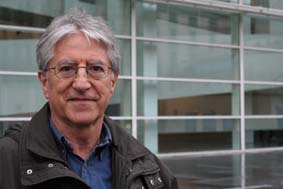
Philosopher Jesús Mosterín is offering today, June 13th at La Nau’s Aula Magna, the lecture ‘La buena muerte’. This lecture is organized by Instituto de Historia de la Medicina y de la Ciencia López Piñero, which is a mixed centre attached to Universitat de València and the Higher Council for Scientific Research. This activity is included in the lectures offered by Claustre Obert, the meeting space for discussion created by UV and the daily El País in order to analyze current economical and social events. Mosterín’s lecture is dealing with death as a human reality and as scientific and philosophical phenomenon. The event is scheduled at 18:30.
During this first lecture, which is going to be presented by José Antonio Díaz, director of the IHMC López Piñero and chaired by the Vice-principal for Culture, Equality and Planning, Antonio Ariño, Jesús Mosterín is explaining how he sees the end of life. According to him, ‘all the real things have an end and finish sometime.’ But not everything dies. Strictly speaking, only living beings die, and in order to have a life terminated it must be life before. Most of the living beings are cells. Death is a process that ends when the last cell dies. Life is a cosmic exception, so death re-establishes thermodynamic balance and normality.
Human beings might face death passively or conciously and rationally. ‘Our life, in the biological way, is determined by our genome and environment. However, to some extent our life, in the biographical way, is like a work of art that can be designed by us.’ Mosterín thinks that we ‘can read a good novel of our lives, including the final chapter: death. A good death chosen by us.’
This lecture is framed in a cycle of lectures on the occasion of a funerary art exhibition by Grupo Mémora titled La otra cara de la vida. Cultura funeraria, ayer y hoy. It is organized by the Office of the Vice-principal for Culture, Equality and Planning, the CSIC and Grupo Mémora. The exhibition was opened last Friday at the Instituto de Historia de la Medicina y de la Ciencia Lopez Piñero, and it includes more than a hundred funerary archaeological tools used in Spain throughout its history. This exhibition’s goal is to promote the critical view of death as the other side of life.
Jesús Mosterín
Jesús Mosterín carried out his studies in Spain, Germany and the United States. He became a full university professor at Universitat de Barcelona and currently he is lecturer of research at the Philosophy Institute (CSIC). Moreover, he is a member of Center for Philosophy of Science in Pittsburgh, European Academy in London, Institut International de Philosophie de Paris, and International Academy of Philosophy of Science. He introduced analytic philosophy in Spain. This XXth century’s movement focuses on the study of language with the goal of solving the philosophical problems through the analysis of the terms taking part in their formulation.
Last update: 13 de june de 2012 08:19.
News release



















